A Victory, A Trial, or Something More Complex: A Couple’s Reflections on Caregiving and Dissertating During the COVID-19 Pandemic
Abigail Michelini & Scott DeLoach
Keywords: parenting
Scott
We met in 2016 during our summer-residence doctoral program. Neither of us was from Indiana, Pennsylvania (Abby was from New Jersey and I was from California), but that (thankfully) didn’t stop us from falling in love and giving a long-distance relationship a shot at summer’s end. By August 2017, Abby had taken a job at the same university I taught at, and by January 2018, she was pregnant with our son, Miles.
Despite being pregnant while working a full-time, 12-month, academic lecturer position which required her to report to work on a 9-5 schedule 5 days a week, Abby had managed to find time in the nooks and crannies of the day to work on her dissertation. When Miles was born in October 2018, Abby took off ten days for postpartum recovery before resuming her nook-and-cranny approach to her diss: 15 mins here, 20 mins there. The woman is relentless.
I faced far fewer obstacles when I began my initial foray into dissertating. Not being pregnant and having a much more flexible teaching schedule as a 10-month lecturer allowed me to chunk out fairly large amounts of time each week to devote entirely to my dissertation. After 18 months of prep work, I began collecting data for my study in January 2020. I was moving at a pretty good pace until the pandemic. When the COVID outbreak forced all instruction to pivot online in mid-March of that year, my original study was effectively canceled prematurely without enough data to answer my research question with any real legitimacy. I was faced with an extremely difficult decision:
- Pause my study and hope that things would return to normal in a few weeks, so I could continue as originally planned;
- Wait until a future semester and restart my original study;
- Or quickly figure out another dissertation topic, so I could still hope to graduate in a timely manner.
With the help of Abby and my ever-supportive dissertation adviser, I decided that there were too many unknowns to risk pausing my original study until the world returned to normal. Even though it was an incredibly difficult decision to leave my original study behind, I was able to quickly adjust the topic of my dissertation to examine the effect of the emergency pivot online upon first-year, first-generation college students. Because I was already focusing on this population of students for my original study, the disruptive nature of starting fresh was somewhat mitigated. However, for lack of a better term, it sucked being forced by the pandemic to change my dissertation topic to a completely different one after a year and a half of work.
Abby
When COVID-19 rearranged the breakneck pace of our everyday commute, childcare, work, and dissertation obligations into a new chaos of no childcare, working from home, and those same dissertation obligations, the pandemic both gave and took away. In all our panic and paranoia, we stayed healthy, and for this I am immensely grateful. However, both of our priorities and schedules shifted drastically. Since I am Assistant Director of a writing and multiliteracy center, my schedule has always been rather set in stone, and my working-from-home COVID hours became 8:30am-4:30pm via Zoom, roughly the hours our online center was open. Thankfully, my husband’s teaching schedule, which shifted to an asynchronous modality at the onset of the pandemic, allowed him more flexibility but required so much more of him parenting-wise. Our daily schedule in Spring 2020 looked like this:
KEY:
GREEN = WORK
BLUE = DISSERTATION WORK
TEAL = DISSERTATION OR WORK
YELLOW = PRIMARY CAREGIVER
PINK = FAMILY TIME
ORANGE = OTHER HOUSEHOLD DUTIES
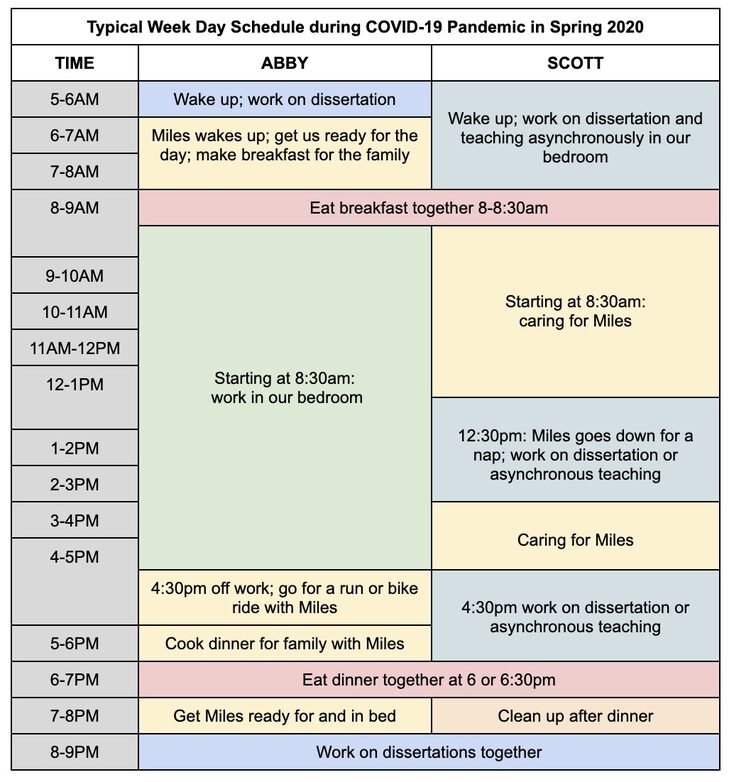
Image description: A color-coded typical weekday schedule for Abby and Scott during Spring 2020 of the Covid-19 Pandemic. It runs from 5am through 9pm and details who was caring for their son, Miles, who was working their job, who was dissertating, and who was caring for the household. Every single hour is assigned a parenting or work task.
I replaced my 5am wake ups to workout with 5am wake ups to squeeze in some quiet dissertation time, usually for 30-60 minutes before our son, Miles, woke up. Scott answered to the same alarm, dissertating and doing work until about 8am in our bedroom, at which point we all ate breakfast together before I had to report to work at 8:30am (again, in our bedroom). Without childcare, Scott took on our primary parenting duties from 8:30am-12:30pm, when Miles would go down for a nap and Scott would go back to work.
Nothing was open: no parks, no play centers, no entertainment of any kind. This meant our two-bedroom apartment was our world; oftentimes, Miles’s shrieks, tantrums, and joy would permeate the bedroom where I was working, teaching, supervising, and offering workshops. While Miles slept, Scott would join me in our “office”: a space we squeezed a desk into next to our bed in order to both work, both talk to students at the same time, both concentrate. (Eventually, for Father’s Day in June, when it became evident things were not going to change anytime soon, we bought another desk and set it up in our garage.) When Miles woke up from a nap around 3pm, Scott again took him until my work obligations ended for the day at 4:30pm. Then, Scott was back to work while I went for a short run or bike ride with Miles and made dinner. Around 6 or 6:30pm, we ate dinner together before putting Miles to bed around 7:30pm. After that, we cleaned up the kitchen and apartment and tried to do another “power hour” of writing our dissertations from 8-9pm together. On the weekends, we switched off working on our dissertations: Scott taking Saturdays and myself taking Sundays in 4-6 hour chunks.
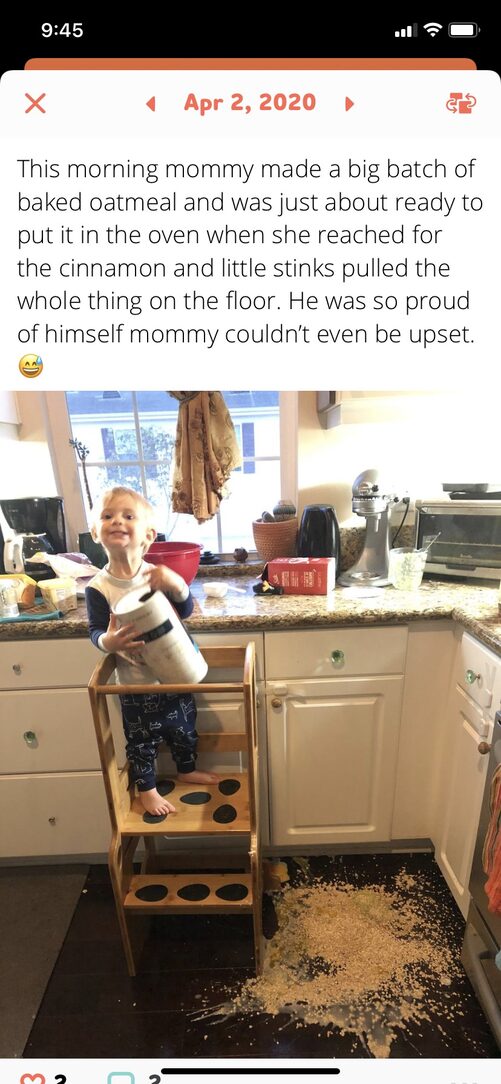
Image description: Miles is standing on a stool in the kitchen smiling and holding an empty container of oatmeal while surrounded by a huge spilled mess of oatmeal bake he has dumped on the floor. The writing on the image reads: “This morning mommy made a big batch of baked oatmeal and was just about ready to put it in the oven when she reached for the cinnamon and little stinks pulled the whole thing onto the floor. He was so proud of himself mommy couldn’t even be upset.”
Scott
Looking back at the last few weeks of March 2020, I can say that the PhD student part of me was in full-on sink-or-swim, fight-or-flight survival mode. The world was scary, and my new dissertation was in a fledgling state. However, Miles didn’t know any better, and that was probably for the best. While the world convulsed with fits and starts in response to the virus rampaging around the globe, our toddler was blissfully unaware of anything beyond his immediate temporal reality. The biggest change for him was that our neighborhood park was closed, meaning he couldn’t sit on the swings he loves so much. This meant that, while Abby worked and I watched Miles, he and I had to make our own fun.
Often, we would take out every toy he had and just, like, move around the living room, playing with them one by one.
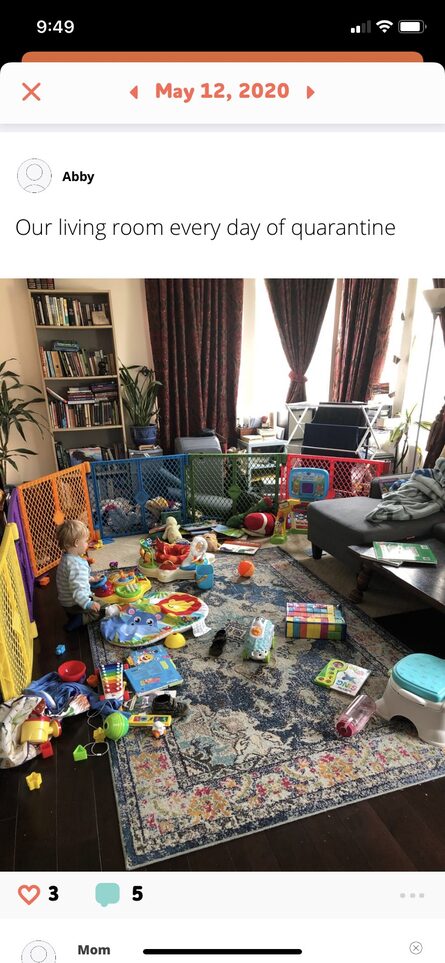
Image description: Miles is sitting in a very messy living room surrounded by all sorts of toys, a toddler potty, and a blanket thrown on the couch. Text on image reads, “Our living room every day of quarantine.”
At some point early in the stay-at-home order, Miles got really interested in woodpeckers. We had this Eric Carle book with buttons that made different animal sounds. Miles loved the woodpecker one, and would make rapid taps on his chest to imitate the quick pecking noise. I was happy to indulge his curiosity, so we watched many YouTube videos about Acorn Woodpeckers, a local species for us.
After he got bored of the woodpecker lessons, we moved on to dragonflies, and then after dragonflies, it was crows. Passing the time this way was a welcome respite from stress-watching the daily press conferences about rising infection rates and death tolls. I’ll be forever grateful that he was oblivious to the fear and confusion that so permeated the rest of our collective experience. Spending most of my day in his world—playing with blocks, listening to Baby Shark on repeat, becoming enamored with a growing knowledge of a bird that uses its beak to drill a small hole in the bark of a tree to put an acorn in to eat later—provided a series of brief moments where I would forget about the state of the world and just be grateful to live life through his eyes. When I think back on the spring 2020 COVID quarantine, I’ll think about my diss, I’ll think about disinfecting Amazon boxes, and I’ll think about teaching my son about Acorn Woodpeckers.
Abby
I have two multimodal documentations of this time period. One is of the pictures we took and logged on Tinybeans, our alternative to social media that still allows us to share pictures of our son with faraway family. In these posts, you can see how temporary we thought these events would be: working from home, staying secluded, washing and sanitizing everything.
One event that stands out from this time is in April 2020, when Miles and I went for a bike ride in the afternoon, crossing through the closed park next to our apartment to get to a bike path in a nearby neighborhood. On our way home, I needed to cross through the park again in order to get back to our apartment and was surprised when a police officer stopped us, asking why we were in the closed park. I explained shortly that we lived right there, and he urged us to get inside right away and told us that we should not be utilizing the park, even to cross through it. Without a yard, this meant it was nearly impossible to even get outside, not that it stopped us. You can only keep a toddler cooped up in a two-bedroom apartment for so long, after all.
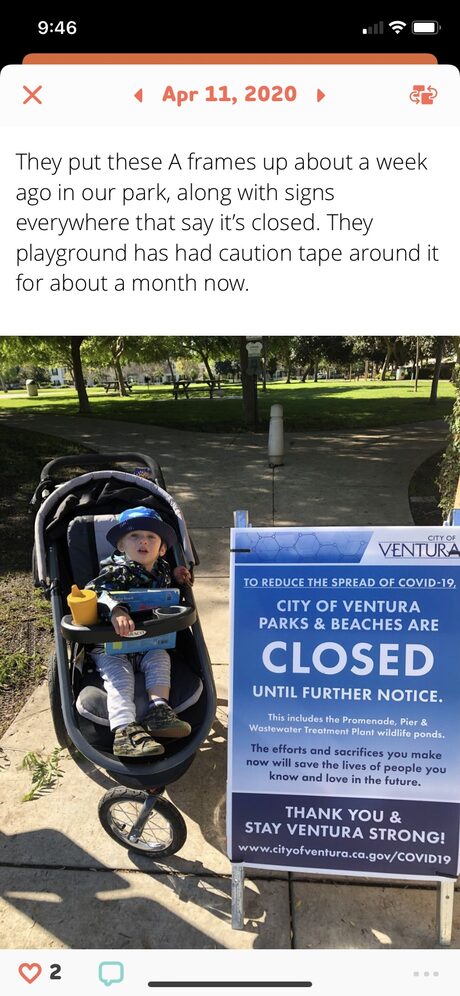
Image description: Miles is sitting in a stroller at the entrance to a park with a sign that reads “To reduce the spread of Covid-19, City of Ventura Parks & Beaches are CLOSED until further notice.” Text on image reads, “They put up these A frames about a week ago in our park, along with signs everywhere that says it’s closed. The playground has had caution tape around it for about a month now.”
The second documentation I have is of my dissertation log, which runs until I defended and turned in my final draft in November 2020. In this, I can see the stress and determination that encapsulated this time period. In the image below, which shows a snapshot of March 2020, with a column for work done, a column for hours logged, and a monthly log column, you can see that from March 12-18, I did no dissertation work, but only worked to get our writing and multiliteracy center functional online. On March 19, I wrote “Finally, took a breath — WMC is fully functional online and first course module is up and functioning - ready to be back at it.” I worked steadily during this time, more so than I had been, perhaps because of the threat of losing momentum altogether, and the fear of not finishing.
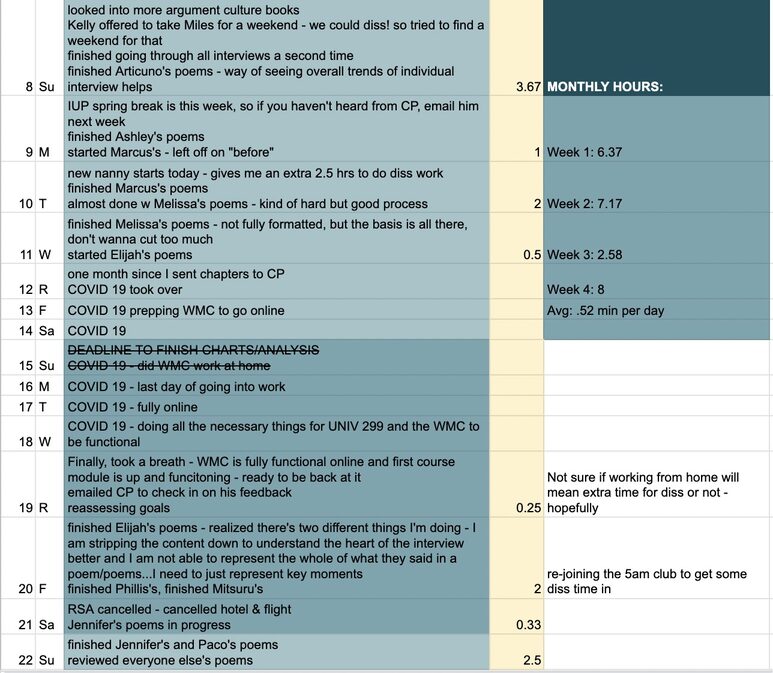
Image Description: A sample of Abby’s dissertation log detailing what she did each day from March 8, 2020 to March 22, 2020. This shows how she consistently worked on her dissertation up until the lockdown began on March 12, then was derailed from her normal schedule until March 19, at which point she was able to return to working on her dissertation.
Abby & Scott, June 2021
The last year of COVID was exhausting, draining, and scary, complicating our lives in many ways while simplifying it in others. As we write this, we search for a thread of meaning but come away uncertain. Maybe it’s that we are still living this story and don’t have enough distance from it yet to really have any clear perspective on the experience. And yet, the most complicated events of our lives don’t fit into any easy narratives anyway. When we try to tell them that way, we are often disappointed in ourselves; there are so many ways a series of events can be told: as a victory, as a learning experience, as a trial.
COVID was all of these things for us. Depending on the day, we were persevering, cowering, laughing, crying, worrying (or all of the above). The immense toll that COVID had on our world and our collective (and individual) psyche will take a while to fully unpack. We’re still mourning the loved ones we’ve lost, and still living in the reality of masked indoor experiences. But life, for better or worse, moves forward.
Miles will soon turn 3 and begin preschool. We recently attended a small graduation ceremony for completing our PhDs. Scott will return to in-person teaching in August 2021, and Abby will return to work after her maternity leave ends in October. Our baby daughter will be born soon into a world that is coming out of its darkest period in decades, and we can only hope that she will have no memory of anything COVID-19 related.
What will we remember about the COVID quarantine? For one, it required us to be flexible with when and how we did our jobs and worked on our dissertations. It allowed (forced, really) way more family time than we ever had before or will ever have again.
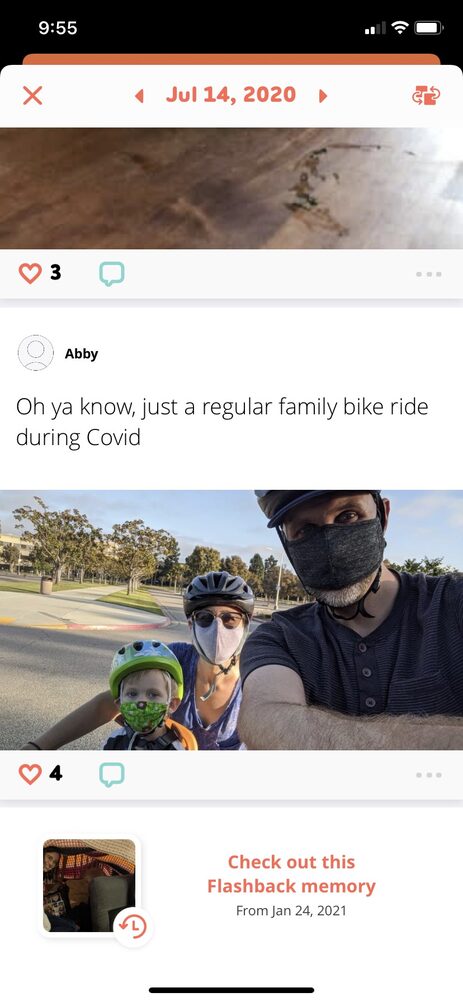
Image Description: Abby, Scott, and Abby pose on a bike ride with masks on. Text on photo reads, “Oh ya know, just a regular family bike ride during Covid.”
Living in lockdown with a toddler compelled us to be more creative in how we parented, more patient with how we disciplined, and more understanding of one another’s emotional well-being. We hope this is what comes to mind when we think about our time as a family during COVID.
Bio
Abigail Michelini is a mom of two, wife of one, and (newly) Assistant Professor of English at Northampton Community College. She is also Poetry Editor of Oyster River Pages, where she runs a poetry internship for students.
Scott DeLoach is a husband (see above), father (see above again), and teacher-scholar. He currently teaches writing at Albright College, and lives in Bethlehem, PA.
